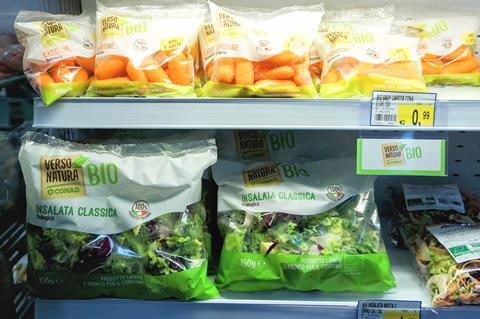Alliance for Sustainable Packaging for Foods questions validity of Commission’s research, and argues it will lead to more food waste and lower food safety

The European Commission’s efforts to reduce the environmental impact of packaging are based on inadequate scientific research, according to a pan-industry group called the The Alliance for Sustainable Packaging for Foods (ASPF).
The organisation, which represents hundreds of companies along the entire fresh fruit and vegetable supply chain, as well as stakeholders from the dairy and meat industries, said research cited by the European Commission in favour of removing packaging did not take into account the potentially more negative overall impact of such a move.
In a statement, the alliance said that while it applauded the “science- and data-driven approach” that the European Commission’s Joint Research Centre (JRC) had undertaken – including a life-cycle analysis of reusable and single-use packaging for food – it believed the research failed to take into account food loss and waste.
“Publication after publication highlights the fact that studies of the environmental impact of packaging often overlook the environmental footprint of food that is lost or wasted due to inadequate packaging,” it stated. “In fact, the totality of the environmental footprint of lost or wasted food due to inadequate packaging can be greater than the impact of packaging itself.”
Much harder to quantify, it said, was the role that packaging plays to ensure food safety. ASPF said it had summarised “dozens” of peer-reviewed studies in a recent position paper that highlights the critical relationship between packaging and food safety.
“We also urge the regulators to consider technologies that offer alternatives to packaging,” it continued. ” “For example, functional price look up (PLU) stickers provide important information about the origin of the product and information necessary for food safety traceback on thumbnail-sized stickers which can be used in place of packaging.”
Trilogue tribulations
The Commission, European Parliament, and Council of EU member states are currently engaged in discussions known as a trilogue to reach a final agreement on new regulation based on the EC’s Packaging and Packaging Waste Proposal. The Parliament’s and Council’s positions on PPWR do differ, but that process is nevertheless expected to conclude on 4 March.
But companies across the fresh produce business and in other food industries insist that EU packaging rules are a ‘threat’ to their supply chains and will only increase food waste, reduce food safety, and jeopardise livelihoods.
Like many of those companies, ASPF fears that the EU’s “well-intentioned” efforts to limit and cut single-use packaging waste put the health and safety of European consumers at risk.
“This is one of the reasons why ASPF urges the EU legislator to carefully consider food safety and food quality considerations for packaging of unprocessed fruits and vegetables under 1.5kg, and to maintain – until alternatives are found – the use of all functional stickers as they eliminate the need for packaging.
“Furthermore, it is important that the legislation ensures food safety aspects are considered when adopting rules on the minimum recycled content for packaging coming in contact with foods.”
ASPF includes 15 non-profit organisations that represent stakeholders along the entire conventional and organic food supply chain for fresh fruits and vegetables, dairy, and meats.
According to a spokesperson, at least 100 EU-based stakeholders that belong to ASPF account for €20bn of economic activity across the bloc.



